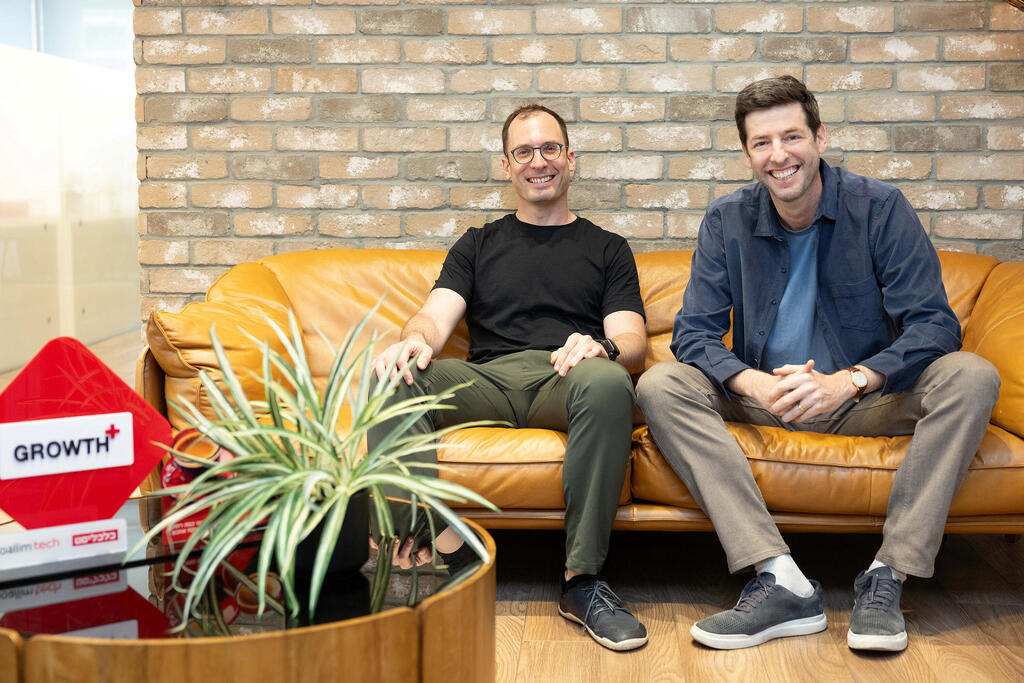In today’s challenging high-tech landscape, building a successful startup takes more than just a strong product—it demands clear focus, strategic thinking, and the ability to adapt quickly. As part of the Growth+ initiative by Calcalist and Poalim Tech, veteran entrepreneur Rotem Iram, CEO of cyber insurance company At-Bay, sat down with early-stage founder Ido Goldberg, CEO of fintech startup Rainbow, for a candid conversation about navigating setbacks, mastering sales, and translating vision into value.
The conversation was held as part of the Growth+ project by Calcalist and Poalim Tech, aimed at strengthening the resilience of the Israeli high-tech industry—a series of 1:1 meetings between experienced entrepreneurs and early-stage startups, designed to offer advice, support, and insights on entrepreneurship, creativity, startup management, and scaling companies for growth.
Rotem, what was the biggest crisis at the beginning of your journey, and what did you learn from it?
“The most significant challenge was realizing that we weren’t selling what the market actually wanted. We founded a cyber insurance company based on a deep thesis—that we understood cyber risk better than traditional insurance companies and could price it better, too.
“The problem was, no one bought the product. Insurance agents who sell financial products in the U.S. didn’t see any added value for themselves or their customers. We hadn’t created a product with better coverage, better pricing, or any clear reason for them to work with us.
“We had to undergo a profound shift in our thinking: the value we create isn’t just in the insurance product itself but in how we deliver value to the customer. Our breakthrough came when we automated the insurance purchasing process. What used to take an agent three days—from quote to sale—became a 30-second process with us.
“Although the product wasn’t necessarily better, the experience was a hundred times faster, and that gave agents a real reason to prefer us over competitors.”
Ido, what was your biggest challenge this year?
“I really connect with the theme of focus—when you don’t focus on the right things, you create gaps.
“In our case, we put a lot of emphasis on offering value to the customer but neglected the critical issue of actual sales. Our challenge was to learn how to sell the value we had created. To address this, we recruited people and built internal processes that helped us close these gaps.
“The big challenge was understanding how to sell the value, how to speak the customer’s language—especially to people who aren’t necessarily ‘early adopters’—and how to make our offering relevant to a broader audience.”
Rotem, what advice did you give Ido for dealing with this difficulty?
“Entrepreneurs are usually great at selling the vision, but in practice, most of their focus goes to the product, not the sale—and that’s a mistake.
“You can’t build a product without understanding how to sell it. The sales channel is like a lock, and the product has to fit through it. If you don’t grasp this from the beginning, you’ll crash into walls.
“Product-Market Fit isn’t just about features—it’s about understanding how to sell them, and to whom. In the end, the best product doesn’t always win; usually, it’s the product that is most effective within the relevant sales channel.”
Ido, what did you take away from the conversation with Rotem?
“First of all, the importance of thinking about value, not just about the product itself. It opened my mind to think differently about the value we create, and even about reaching new audiences we hadn’t considered before.
“Second, we talked about managing expectations with investors—how critical it is to focus on this aspect just as much as on product development.
“And finally, understanding that focus is everything. It’s more important to talk about and deliver value than to endlessly perfect the product.”
Michal Kissos Hertzog, CEO of Poalim Tech, which initiated the Growth+ project, said:”In 2025, entrepreneurs once again find themselves facing a complex reality: on the one hand, rapid technological progress, especially in the field of artificial intelligence, and on the other, geopolitical and economic challenges. The security situation in Israel continues to affect the local economy, and uncertainty increases the pressure on entrepreneurs, who must navigate their businesses through constantly changing conditions. The challenge is not just to survive, but to grow and innovate. In the midst of all this, it’s crucial to remember the value of personal balance. The ability to take breaks, spend time with family and friends, and maintain mental and physical health is not a luxury—it is a condition for long-term success. Entrepreneurs who manage to combine intensive work with a balanced life are the ones who can lead their companies forward, even in difficult times.”
Through the Growth+ project, Calcalist and Poalim Tech continue to connect entrepreneurs with experienced mentors, providing tools and support for the challenging journey of building successful companies in today’s environment.








